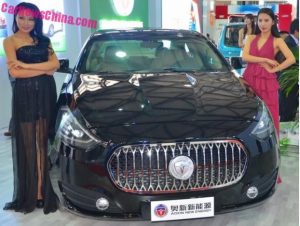
Aoxin Ibis Chinese electric car.
Credit: Green Car Reports
On Saturday, a Chinese official told the audience at an auto forum in Tianjin that the government is working on a timetable to end “production and sales of traditional energy vehicles,” i.e., gasoline and diesel cars, according to accounts from the Xinhua News Agency. Regulators have begun the “relevant research,” and the policy will be implemented “in the near future.”
Details are somewhat sketchy, but it appears the government plans to shift away from the massive research and consumer subsidies of recent years to something like a cap-and-trade program for fuel economy and emissions, with automakers facing rising quotas but tradable credits providing some compliance flexibility.
It’s not a concrete policy yet; we’ll have to see how it’s implemented. But for a moment, look beyond the policy to the optics. This is the world’s largest car market — responsible for around 30 percent of global passenger vehicle sales — announcing an imminent end to fossil fuel cars. That’s a big, big deal.
It is just one of many […]











The entire transportation system needs to be reinvented. Why are we still using combustion engines in planes, trains and automobiles after more than a century of “technological progress”? Something else is dirty besides just our engines.